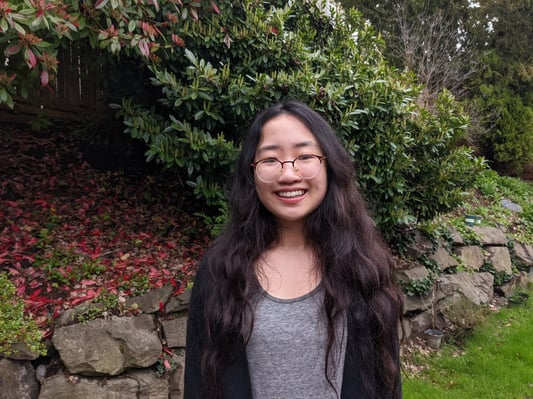Here at Write the World, we always say that peer reviewing and writing have a symbiotic relationship: doing the one helps you become better at the other. Case in point: Eunjae Jeon (US), who won first place AND Best Peer Review in our Op-Ed Competition. She says, “I tried to apply the feedback I gave to my own piece. After suggesting adding a call to action in the conclusion, I made sure to add one to my op-ed as well. And vice versa, I thought of the feedback I had received from my writing teacher (like adding personal stories) and included it in my review.”
Read on to learn more about Eunjae’s personal connection to her op-ed topic, her tips for peer reviewing, and her book recommendation!

In your op-ed, you explored how forcing children to finish their meals can lead to shame and unhealthy relationships around food. How did you choose this important but often-ignored topic? Did you consider several subjects, or did you know what you wanted to write about right away?
Food shame was the first topic that popped into mind. Most people’s minds instantly go to glamorous K-pop stars or K-dramas when talking about Korea (both which I know squat about, though I’m trying to learn a little). So when I traveled to Korea last summer, I received a huge culture shock. Random passersby complimented me on how “skinny” I looked. Family members egged me on to eat just one more bite (because gosh darn it, I’m a growing young lady!). It all brought back sour memories of when I lived there. I don’t have many people I can talk to about food-shaming besides my dad, either in Korea and the United States, so I was very excited to share my thoughts in this op-ed competition.
Guest Judge Rainesford Stauffer praised your piece for putting a childhood experience in a “historical, political, social, and cultural context.” What research did you undertake to make this connection between the personal and the global?
My writing teacher helped me research instances of food-shaming in America, as well as its connection to global food waste. While most of my piece was based off my personal experiences and anecdotes from my dad, I also used sites like the Natural Resources Defense Council and History.com. Most people in Korea don’t see food-shaming as a problem, so I relied more on my immediate family as sources.
What new understanding or potential action steps do you hope readers of your piece will walk away with?
I hope readers can approach other people’s diets with more sensitivity. All my family’s unpleasant experiences were from well-meaning people: parents who wanted their children to be healthier, teachers who tried to reduce food waste, and adults who worried about their grandchildren’s weight. But regardless of the intention, their actions still resulted in negative outcomes. Let people eat what they want!
You also won Best Peer Review! Rainesford Stauffer appreciated how your review “left the writer with really actionable next steps to strengthen the piece.” How did you ensure your feedback was encouraging as well as actionable?
I think reading the piece over many times is important. I caught things on the third or fourth reread that I didn’t notice before. The peer review guidelines were very helpful! I think keeping your comments positive helps the author the most.
How did writing your op-ed help you write your peer review, and vice versa?
I tried to apply the feedback I gave nidd_ to my own piece. After suggesting adding a call to action in her conclusion, I made sure to add one to my op-ed as well. And vice versa, I thought of the feedback I had received from my writing teacher (like adding personal stories) and included it in my review.
What’s a book you’ve read lately that you’ve loved?
I loved the Scythe series by Neal Shusterman. It explores the tricky morals of “gleaning” people in a perfect—yet stagnant—society. Check it out!





